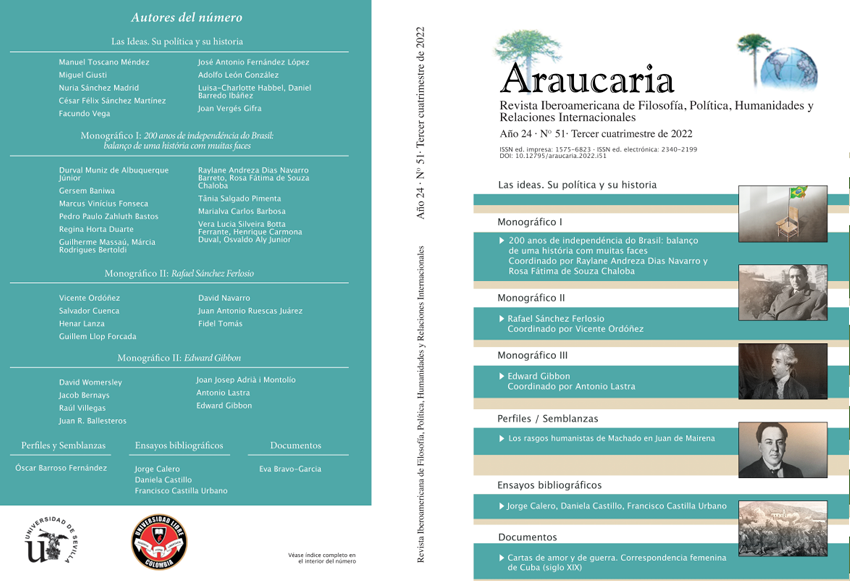THE MIRROR-INVERTED ASSIMILATION
JUDAISM, EMANCIPATION AND NEGATIVE IDENTITY
DOI:
https://doi.org/10.12795/araucaria.2022.i51.06Keywords:
Judaism, Enlightenment, assimilation, emancipation, pariah, negative identityAbstract
From the late 18th century, the gradual integration of European Jews into the modern State as a result of a process of political, social and religious emancipation will change the Jewish identity forever. The Enlightenment will be an overriding period in this process that will not only take them out of the ghetto and towards political equality but will also bring about dispersion and loss. In this paper we’re going to look into this process within the German Judaism, for its historical importance, its quality of model and the significance of the changes it underwent. We will also address in the second part of our work the idea of negative identity, as a waste and consequence of the history of the twentieth century, showing its links to the very illustrated origins of the issue.
Downloads
References
Ascher, Saul, “Leviathan”, en P. R. Mendes-Flohr & J. Reinharz, The Jew in the Modern World. A Documentary History, Nueva York, Oxford University Press, 1995, pp. 99-103
Arendt, Hannah, Los orígenes del totalitarismo. Antisemitismo, Madrid, Alianza Editorial, 2002
Arendt, Hannah, La tradición oculta, Barcelona, Paidós, 2004.
Arkush, Allan, Moses Mendelssohn and the Enlightenment, Albany, State University of New York Press, 2012.
Barnard, Frederick M., Herder on Nationality, Humanity, and History, Montreal, McGill- Queen’s University Press, 2003.
Baron, Salo W, “The Jewish Question in the Nineteenth Century”, The Journal of Modern History, 10/1 (1938), pp. 51-65.
Bärsch, Claus-E, “Politics and Religion in the Philosophy of the Enlightenment: Kant”, en B. Labuschagne & R. W. Sonnenschmidt (eds.), Religion, Politics and. Law, Leiden, Brill, 2009, pp. 129-166.
Berkovitz, Jay R, The Shaping of a Jewish Identity in Nineteenth-Century France, Detroit, Wayne State University Press, 1994.
Deutscher, Isaac, The Jewish non-Jewish and other Essays, Boston, Alyson, 1982.
Dohm, Christian W., Über die burgerliche Verbesserung der Juden, W. Ch. Seifert (ed.), Gotinga, Wallenstein Verlag, 2015.
Erspamer, Peter, “Von Dohm’s On the Civic Improvement of the Jews”, en S. L. Gilman & J. Zipes (eds.), Yale Companion to Jewish Writing and Thought in German Culture, New Haven, Yale University Press, 1997, pp. 75-83.
Ettinger, Samuel, “Los judíos en los países absolutistas y durante la revolución Francesa”, en H. H. Sasson (ed.) Historia del pueblo judío. Vol. III 3, Madrid, Alianza Editorial, 1991, 887-90.
Fackenheim, Emil L., “Kant and Judaism”, Commentary, 36 (1963), pp. 460-467.
Fackenheim, Emil L. To Mend the World. Foundations of Future Jewish Thought, New York, Schoken Books, 1982.
Fichte, Johann G., Beiträge zur Berichtigung der Urtelile des Publikums über die französiche Revolution, Hamburgo, Meiner Verlag, 1973.
Frankel, Jonathan, “Assimilation and the Jews in nineteenth-century Europe: towards a new historiography?”, en J. Frankel & S. J. Zipperstein, Assimilation and Community: The Jews in Nineteenth Century Europe, Cambridge, Cambridge University Press, 2004, pp. 1-32.
Friedländer, David & Schleirmacher, Friedrich, A Debate on Jewish Emancipation and Cristian Theology in the Old Berlin, R. Crouter & J. Klassen (eds.), Indianapolis, Hackett, 2004.
Goetschel, Willi, Spinoza’s Modernity: Mendelssohn, Lessing and Heine, Madison, University of Wisconsin Press, 2004.
Graetz, Heinrich, History of the Jews. Vol. V, Filadelfia, The Jewish Publication Society of America, 1956.
Hegel, Georg. W. F., Lecciones sobre la filosofía de la historia, Barcelona, Círculo de lectores, 1996.
Herder, Johann G., Werke (Vol. VI). Ideen zur Philosophie der Geschichte der Menschheit, M. Bollacher (ed.), Frankfurt am Main, Deutscher Klassiker Verlag, 1996.
Hess, Jonathan M., Germans, Jews and the Claims of Modernity, New Have, Yale University Press, 2002.
Kant, Immanuel, Gesammelten Werke Inmanuels Kant (Electronische Edition: https://korpora.zim.uni-duisburg-essen.de/kant/).
Kaufmann, Walter, Hegel, Madrid, Alianza Editorial, 1978.
Keedus, Liisi, The Crisis of German Historicism. The Early Political Thought of Hannah Arendt and Leo Strauss. Cambrigde, Cambrigde University Press, 2015.
Klier, John D., “The pogrom Paradigm in Russian History”, en J. D. Klier & S. Lambroza (eds.), Pogroms. Anti-Jewish Violence in Modern Russian History, Cambridge, Cambridge University Press, 1992, pp. 13-37.
Lessing, Georg E., Escritos filosóficos y teológicos, Madrid, Editora Nacional, 1982.
Loft, Leonore, Passion, Politics, and Philosophie. Rediscovering J.-P. Brissot, Wesport, Greenwood Press, 2002.
Lohman, Uta, „Niemand verdirbt die Bedeutung mehr, als einer, der wörtlich übersetzt“. Das ‘deutsche Original’ von Divre Schalom we-emet: Kontextualisierung und Transkulturation der übersetzung David Friendländer, en I. Lohmann (ed.), Naphtali Herz Wessely. Worte des Friendes und der Wahrheit, Münster, Waxmann, 2014, pp. 59-74.
Mahler, Raphael, A History of Modern Jewry 1780-1815, Londres, Valentine, 1971.
Marx, Karl, La cuestión judía. Sobre democracia y emancipación, A. Hermosa (ed.), Madrid, Santillana, 1997.
Mendelssohn, Moses, Jerusalem, o Acerca del poder religioso y el judaísmo, J. Monter (ed.), Barcelona, Anthropos, 1991.
Meyer, Michael, The Origins of the Modern Jew: Jewish Identity and European Culture in Germany, 1749-1824, Detroit, Wayne State University, 1979.
Pelli, Moshe, Haskalah and Beyond, Lanham, University Press of America, 2010.
Ripalda, José M., La nación dividida, Madrid, FCE, 1978.
Rosenberg, Shlomo, “Identidad e ideología en el pensamiento judío contemporáneo”, Dispersión y Unidad 18/19 (1976), pp. 5-20.
Roth, Joseph, La filial del infierno en la tierra, Barcelona, Acantilado, 2004.
Roudaut, Maïwenn, “Toleranz und Judenemanzipation. Der Dialog zwischen Dohm, Mendelssohn und Mirabeau”, en A. Busch et al. (eds.), Französische-Deutsche Kulturräume um 1800, Berlín, Berliner Wissenschafts Verlag, 2012, pp. 205-219.
Sacks, Elias, Moses Mendelssohn Living Script, Bloomington, Indiana University Press, 2017.
Tomasoni, Francesco, Modernity and the Final Aim of History. The Debate over Judaism from Kant to the Young Hegelians, Nueva York, Springer, 2003.
Weisberger, Adam M., The Jewish Ethic and the Spirit of Socialism, Nueva York, Peter Lang, 1997.
Downloads
Published
How to Cite
Issue
Section
License
Las ediciones impresa y electrónica de esta Revista son editadas por el Secretariado de Publicaciones de la Universidad de Sevilla, siendo necesario citar la procedencia en cualquier reproducción parcial o total.Salvo indicación contraria, todos los contenidos de la edición electrónica se distribuyen bajo una licencia de uso y distribución “Creative Commons Atribución-NoComercial-SinDerivar 4.0 Internacional”








